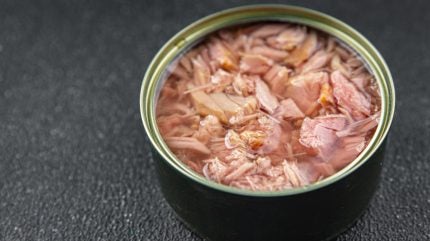

Non-profits Foodwatch and Bloom Association have called on the European Commission to tighten rules on the sale and advertising of tuna products containing high levels of mercury.
Both groups have asked the EU’s executive arm to put in place a “conservative measure” for mercury in tuna at 0.3mg per kg of fresh and canned formats.
Under current EU law, the limit for mercury in tuna is 1.0mg/kg but for other species such as cod the threshold is 0.3mg/kg.
Bloom and Foodwatch have also requested that EU member states “activate a safeguard clause” to prevent the sale and promotion of products exceeding that 0.3mg/kg mercury level.
The NGOs also called on governments to remove “all products” with tuna from school canteens, nurseries, maternity wards, hospitals, and care homes.
The demand follows an investigation by Bloom into mercury levels in canned tuna products sold in Europe. It said it had found 100% of the 148 products tested to be contaminated with mercury.
Access the most comprehensive Company Profiles
on the market, powered by GlobalData. Save hours of research. Gain competitive edge.

Company Profile – free
sample
Your download email will arrive shortly
We are confident about the
unique
quality of our Company Profiles. However, we want you to make the most
beneficial
decision for your business, so we offer a free sample that you can download by
submitting the below form
By GlobalData
Close to 60% (57%) of tins examined contained mercury levels that exceeded 0.3mg/kg.
The highest level found was in a Petit Navire brand sold in Carrefour in France, which contained 3.9mg/kg of tuna.
Other high-mercury products in the list included a Carrefour own-label tinned tuna sold in Spain at 2.5mg/kg, and a Rio Mare product sold in Rewe in Germany containing 1.2mg/kg.
Julie Guterman, researcher and lead author of the Bloom study, said in a statement: “We should not talk about ‘health thresholds’ for mercury in seafood, but about ‘contamination thresholds.’ For more than thirty years, large retailers have been taking advantage of these distorted standards to sell astronomical quantities of mercury-contaminated tuna.
“Following our revelations, supermarkets can no longer hide behind an unfair law. As the final link in the tuna marketing chain, supermarket chains have a moral and ethical duty to ensure that the products they sell are healthy and safe for human health .”
In addition to its demand to the Commission, Foodwatch and Bloom also sent a petition to a list of executives at supermarkets including Carrefour, Les Mousquetaires, Aldi, Lidl, Rewe, Mercadona and Esselunga.
Just Food has asked the above retailers for comment.
Within the petition, the NGOs called on retailers to take tinned tuna products with over 0.3mg/kg of mercury off their shelves, and to halt advertising and promotion of such products. It has also asked retailers to better inform consumers on the risks of mercury in tuna through visible messaging on product labels and online.
Camille Dorioz, campaign director at pan-European NGO Foodwatch, said: “With a much too lax tolerance of mercury levels in tuna, widely consumed in France, and the absence of clear and effective communication on the dangers of this substance, especially for children and pregnant women, consumers may be exposed to a significant risk to their health.
“We demand that the public authorities strengthen regulations and, without delay, that distributors only market products below the most protective threshold. As the last link in the chain, they are responsible for the products they put on their shelves .”
Commenting on the NGOs’ call to action, a spokesperson for the Commission’s health and food safety department said: “Ensuring the highest food safety standards for EU citizens is a key priority for the Commission.
“Decisions in this area are always based on robust science and evidence”.
They added: “The maximum levels are established when the European Food Safety Authority (EFSA) concludes, via their scientific assessment, that the occurrence of a certain contaminant in food causes health risks.
“For this reason, maximum levels for mercury in food are established on the basis of the data we have on the actual, real-life occurrence of mercury in food. We do this by monitoring products that are placed on the market, taking into account the principle of ‘As low as reasonably achievable’ when producers use good practices.
“This means that the maximum levels are established at a level so that most of the products placed on the market can comply with the levels while the products with the highest concentrations of mercury are removed from the market, reducing consumer exposure and protecting health without drastically disturbing food supply.”
They added the most recent “occurrence data” on mercury levels in tuna in 2022 “showed that there was no margin to further reduce the maximum level on the basis of the ‘As Low As Reasonably Achievable’ principle”, meaning the 1.0mg/kg threshold was kept in place.
“It is important to note that there are different specific maximum levels for different fish species, because, as explained above, the maximum levels are established on the basis of their occurrence data.”

